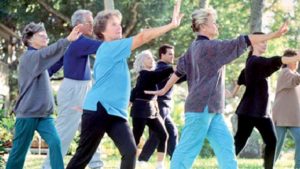Slow Age-Related Physical Decline with Tai Chi
By John M. de Castro, Ph.D.
“This peaceful type of moving meditation is primarily used to improve strength, balance, flexibility and posture. Recent studies of Tai Chi shows that this mind-body practice is able to alleviate pain, improve mood, increase immunity and support heart health.” – World Health net
We celebrate the increasing longevity of the population. But, aging is a mixed blessing. The aging process involves a systematic progressive decline of the body and the brain. Every system in the body deteriorates including motor function with a decline in strength, flexibility, and balance. It is inevitable. In addition, many elderly experience withdrawal and isolation from social interactions. There is some hope as there is evidence that these declines can be slowed. For example, a healthy diet and a regular program of exercise can slow the physical decline of the body with aging. Also, contemplative practices such as meditation, yoga, and tai chi or qigong have all been shown to be beneficial in slowing or delaying physical and mental decline.
Tai Chi has been practiced for thousands of years with benefits for health and longevity. Tai Chi training is designed to enhance function and regulate the activities of the body through regulated breathing, mindful concentration, and gentle movements. Only recently though have the effects of Tai Chi practice been scrutinized with empirical research. But, it has been found to be effective for an array of physical and psychological issues. It appears to strengthen the immune system, reduce inflammation and increase the number of cancer killing cells in the bloodstream. Because Tai Chi is not strenuous, involving slow gentle movements, and is safe, having no appreciable side effects, it is appropriate for all ages including the elderly and for individuals with illnesses that limit their activities or range of motion. Tai Chi has been shown to help the elderly improve attention, balance, reducing falls, arthritis, cognitive function, memory, and reduce age related deterioration of the brain.
In today’s Research News article “Effect of Taichi Softball on Function-Related Outcomes in Older Adults: A Randomized Control Trial.” See summary below or view the full text of the study at: https://www.ncbi.nlm.nih.gov/pmc/articles/PMC5397616/, Lou and colleagues recruited individuals from a senior living community (mean age 63 years) and randomly assigned them to either receive Tai Chi Softball Training for 7 weeks, four times a week, for 90 minutes each, or a no-treatment control group. Tai Chi Softball Training requires practitioners to hold a racket and control a softball on the surface of the racket while performing Tai Chi. Participants were measured before, at 7 weeks, and after training for lower limb strength and balance, and upper limb shoulder mobility, handgrip strength, and fine motor control.
They found that while the control group had deterioration in all measures, the participants in Tai Chi Softball Training had significant improvements in these same measures, including fine motor control, fine motor function, handgrip strength, hand and forearm strength, shoulder mobility, leg strength, and dynamic balance. The practice was found to be safe, as there were no significant adverse effects observed for participation in Tai Chi Softball Training.
These are wonderful results demonstrating that Tai Chi Softball Training is very effective in improving physical functional health in the elderly. This is particularly important as the progressive decline in motor ability in this group impacts their quality of life, health, and even their longevity. It would be interesting in future research to compare Tai Chi Softball Training to regular Tai Chi practice and other exercise programs to determine if one is superior to the others. Hence, Tai Chi because it is effective and gentle, is almost an ideal program for the elderly.
So, slow age-related physical decline with tai chi.
“tai chi may be an easier and more convenient than brisk walking as an anti-aging choice. Previous studies have shown tai chi also improves balance and may help boost brain functioning.” – Linda Melone
CMCS – Center for Mindfulness and Contemplative Studies
This and other Contemplative Studies posts are also available on Google+ https://plus.google.com/106784388191201299496/posts and on Twitter @MindfulResearch
Study Summary
Lou, L., Zou, L., Fang, Q., Wang, H., Liu, Y., Tian, Z., & Han, Y. (2017). Effect of Taichi Softball on Function-Related Outcomes in Older Adults: A Randomized Control Trial. Evidence-Based Complementary and Alternative Medicine : eCAM, 2017, 4585424. http://doi.org/10.1155/2017/4585424
Abstract
The purpose of this present study was to examine the effect of Taichi softball (TCSB) on physical function in Chinese older adults. Eighty Chinese older adults were randomly assigned into either an experimental group experiencing four 90-minute TCSB sessions weekly for seven consecutive weeks or a control group. At baseline and 7 weeks later, all participants were asked to perform physical functional tests for both lower and upper limbs. Multiple separate Analyses of Variance (ANOVA) with repeated measures were applied to evaluate the effects of TCSB on function-related outcomes between baseline and postintervention in the two groups. The findings indicate that a short-term and intensive TCSB training program does not only improve low limb-related physical function such as dynamic balance and leg strength, but also strengthen upper limb-related physical function (e.g., arm and forearm strength, shoulder mobility, fine motor control, handgrip strength, and fine motor function). Health professionals could take into account TCSB exercise as an alternative method to help maintain or alleviate the inevitable age-related physical function degeneration in healthy older adults. In addition, researchers could investigate the effect of TCSB exercise on physical function in special populations such as patients with different chronic diseases or neurological disorder (e.g., Parkinson’s disease).
